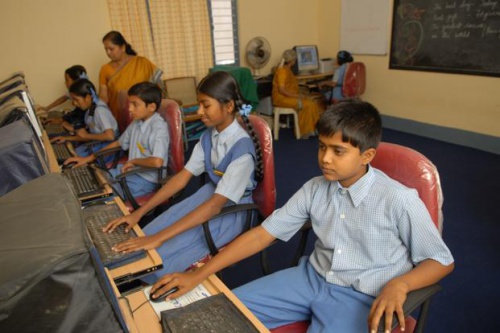Improvement in the rural areas
Today, more people are living in cities than in rural areas. Every day, more people from rural areas are moving to cities to find works. As cities are growing, the rural areas are being left behind and poverty is spreading rapidly. Many rural areas are based on agriculture where young people have to help their family on the field so their education is often inadequate or even lacking. This situation happens in every country, from Africa to Asia, from Central Europe to South America.
A few years ago when teaching in India, Ravi, a Computer professor, took me to visit some classrooms led by his students to teach programming to young people in small rural villages. In a room with only a few laptops and a blackboard, I could see many young people age 10s to 20s worked very hard. To them, having programming skills was the only hope to get out of poverty. Ravi explained: “After having the skill, many can go to cities to find work. Some send money home to help their parents. It may not be much, but it is a beginning”.
Later, I read from newspapers that the India government began to issue Aakash Tablets (i.e., A cheap tablet cost $60 and built in India) to young students in rural areas as a part of their education improvement. When Ravi came to visit me at Carnegie Mellon, he said: “Tablets can help educate more students in remote villages about technology soon it will help improve the standard of living there.” I was skeptical but my friend was positive: “There are over a billion people living in India, it may take a long time to change but we are looking forward to a better future with technology.”
Last month Ravi came to see me, this time he explained how Information technology has transformed the lives of people in rural villages. He showed me several mobile apps developed by his students. Some use Artificial intelligence to predict the price of crops in the future market so farmers can begin to grow crops that will give them the best prices. He said: “These mobile apps were developed by my students, many of them were the same young people that you saw learning to program in a village many years ago. Coming from the rural area, they know the problems that their parents were facing so they are solving them using technology. As sons and daughters of farmers and fisherman, their heart belongs to their farm, their rivers, their land and after having education, they are driving the change themselves instead of relying on help from others. When farmers have more information about market prices, they can get the best prices for their crops without having to go through the middle person. Some farmers are now organizing themselves into a cooperation group and using mobile apps to sell products online. People in cities can buy directly from the Co-op instead through a middleman. There are mobile apps that give them access to market news, weather, price quotes, bids etc.. There are mobile apps providing information on pest control, chemical uses, fertilizers, and specific product use rates. There are apps that allow farmers to monitor their field conditions and irrigation activity using drones and control from smartphones. I was shocked to see so many useful mobile apps that his students created.
Ravi continued: “Using technology, these young people are creating more jobs by having their own village people to deliver products to buyers in cities. He showed me a video on his smartphone of a hundred motorcycles carrying fresh products from villages to cities and deliver directly to customers. I was delighted: “It looks like you have a mini-Amazon here.”
Ravi concluded: “As more students in rural villages have access to the Internet and learning from the virtual classroom, they begin to keep up with students in cities. Many farmers now believe that technology is the future so they let their children go back to school instead of working in the field. It begins to change and soon these young people could be a major force to transform their own villages.”
Sources
- Blogs of Prof. John Vu, Carnegie Mellon University
